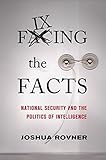Fixing the Facts : National Security and the Politics of Intelligence / Joshua Rovner.
Material type: TextSeries: Cornell Studies in Security AffairsPublisher: Ithaca, NY : Cornell University Press, [2011]Copyright date: ©2015Description: 1 online resource (280 p.) : 1 line drawing, 5 tablesContent type:
TextSeries: Cornell Studies in Security AffairsPublisher: Ithaca, NY : Cornell University Press, [2011]Copyright date: ©2015Description: 1 online resource (280 p.) : 1 line drawing, 5 tablesContent type: - 9780801463136
- Intelligence service -- Political aspects -- United States
- National security -- United States
- Political Science & Political History
- U.S. History
- POLITICAL SCIENCE / Security (National & International)
- intelligence agencies, political intelligence, intelligence-policy, national security, security affairs, threat assessment, military strategy, foreign policy, intelligence politicization, policymaking
- 327.1273 23
- JK468.I6 R687 2016
- online - DeGruyter
| Item type | Current library | Call number | URL | Status | Notes | Barcode | |
|---|---|---|---|---|---|---|---|
 eBook
eBook
|
Biblioteca "Angelicum" Pont. Univ. S.Tommaso d'Aquino Nuvola online | online - DeGruyter (Browse shelf(Opens below)) | Online access | Not for loan (Accesso limitato) | Accesso per gli utenti autorizzati / Access for authorized users | (dgr)9780801463136 |
Frontmatter -- Contents -- Preface -- 1. A Basic Problem: The Uncertain Role of Intelligence in National Security -- 2. Pathologies of Intelligence-Policy Relations -- 3. Policy Oversell and Politicization -- 4. The Johnson Administration and the Vietnam Estimates -- 5. The Nixon Administration and the Soviet Strategic Threat -- 6. The Ford Administration and the Team B Affair -- 7. Intelligence, Policy, and the War in Iraq -- 8. Politics, Politicization, and the Need for Secrecy -- Appendix A: Pathologies of Intelligence-Policy Relations -- Appendix B: Varieties of Politicization -- Notes -- Index
restricted access online access with authorization star
http://purl.org/coar/access_right/c_16ec
What is the role of intelligence agencies in strategy and policy? How do policymakers use (or misuse) intelligence estimates? When do intelligence-policy relations work best? How do intelligence-policy failures influence threat assessment, military strategy, and foreign policy? These questions are at the heart of recent national security controversies, including the 9/11 attacks and the war in Iraq. In both cases the relationship between intelligence and policy broke down—with disastrous consequences.In Fixing the Facts, Joshua Rovner explores the complex interaction between intelligence and policy and shines a spotlight on the problem of politicization. Major episodes in the history of American foreign policy have been closely tied to the manipulation of intelligence estimates. Rovner describes how the Johnson administration dealt with the intelligence community during the Vietnam War; how President Nixon and President Ford politicized estimates on the Soviet Union; and how pressure from the George W. Bush administration contributed to flawed intelligence on Iraq. He also compares the U.S. case with the British experience between 1998 and 2003, and demonstrates that high-profile government inquiries in both countries were fundamentally wrong about what happened before the war.
Mode of access: Internet via World Wide Web.
In English.
Description based on online resource; title from PDF title page (publisher's Web site, viewed 26. Apr 2024)


